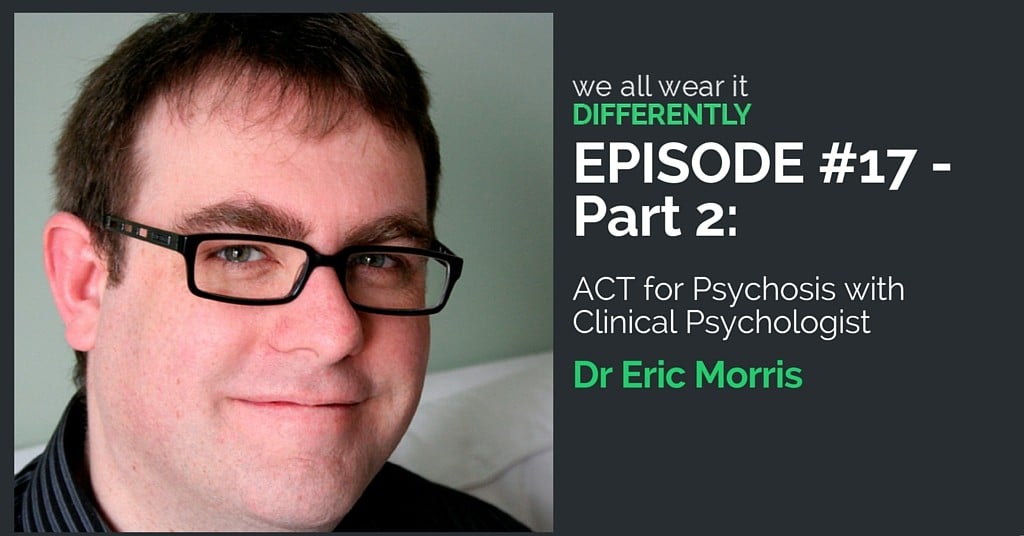#17 – Part 2: ACT for Psychosis with Clinical Psychologist Dr Eric Morris

Dr Eric Morris is a clinical psychologist and researcher based in Melbourne, Australia. He currently works as the Director of the La Trobe University Psychology Clinic. Previously he worked as a consultant clinical psychologist and the psychology lead for early intervention for psychosis, at the South London and Maudsley NHS Foundation Trust, UK.
Eric trained as a clinical psychologist in 1994-1995 at Murdoch University, specialising in psychological interventions for psychosis. On qualifying he worked in a pioneering service for early intervention for psychosis in Perth, Western Australia, before moving to the UK in 1999 to work for the National Health Service in Hampshire and South London. His clinical experience is in providing cognitive-behavioural and family interventions for people recovering from serious mental illness (psychosis, bipolar disorder) and their families.
Eric has been practising Acceptance and Commitment Therapy (ACT) for 15 years, including supervising and training therapists in this area. He is a founding member and a former chair of the Acceptance and Commitment Therapy Special Interest Group (ACTSIG) of the British Association for Behavioural and Cognitive Psychotherapies.
In 2013 Eric completed his PhD at the Institute of Psychiatry, Psychology & Neuroscience, King’s College London, researching psychological flexibility and auditory hallucinations. He also researched ACT as a group-based intervention for people recovering from psychosis, and as a workplace resilience training for mental health workers.
Eric is a co-editor of the cutting-edge new textbook, Acceptance and Commitment Therapy and Mindfulness for Psychosis.
Eric's Suggested Resources
- Association for Contextual Behavioral Science – an inspiring international community and a website with many ACT resources. Basically, ACBS is the type of psychological society that I hoped existed when I first qualified – progressive scientically, committed to making the world a better place for all, open and sharing: https://contextualscience.org/
- Article – The Origins of a Worldwide Contextual Community: Steve Hayes on ACBS Eric's take on why ACBS matters
- To get a sense of how Acceptance and Commitment Therapy may be a useful approach for people with psychosis, check out this case study: Using Acceptance and Commitment Therapy With People With Psychosis : A Case Study
-
Books
- A self-help guide to Acceptance and Commitment Therapy that Eric co-authored with Joe Oliver and Jon Hill, called “ACTivate Your Life”. You can download the first chapter here: http://drericmorris.com/book/activate-your-life/
- ACT and mindfulness therapies for psychosis coedited by Eric Morris, Louise Johns and Joseph Oliver (2015)
Eric's Self-Care Tip
- Have friends that are psychologists – they can be very useful friends.
- Reach out and connect with other people. Be social and compassionate.
- Let yourself be cared for when you need it.
- Be a good consumer and participant of supervison. If you’re getting poor supervision seek out an alternative. Ideally have a supervisor who you can be open with and who will support and challenge you.
Feedback
Leave me a comment or some feedback about this episode in the comments section. I’ll respond to everyone!
- # 63 – Paediatric Chronic Pain with Dr Nicki Ferencz - November 13, 2020
- # 64 – Chronic Pain with Sports and Exercise Psychologist Damien Stewart - November 11, 2020
- # 62 – Pain Management with Dr Jacqui Stanford - November 8, 2020
